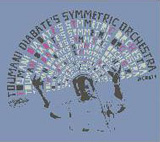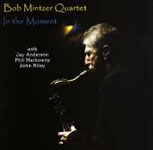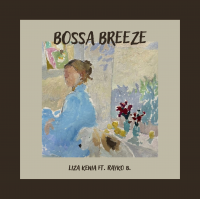Home » Jazz Articles » African Jazz » Malian Strings: Kora & Guitar
Malian Strings: Kora & Guitar
 Toumani Diabaté's Symmetric Orchestra
Toumani Diabaté's Symmetric Orchestra
Boulevard de l'Indépendance
World Circuit/Nonesuch
2006
For the past decade, kora player and bandleader Toumani Diabaté has performed regularly on Friday nights with his Symmetric Orchestra at the Hogon, an outdoor club in Bamako, Mali. Even though he's taped nearly every concert the group has performed, this disc (which was recorded at the Hotel Mandé in Bamako) is the band's first official release.
Diabaté's roots as a griot (hereditary) musician have informed every one of his recordings to date, from his mind-blowing solo kora debut, Kaira (Hannibal, 1988)—recorded in a single afternoon with no overdubs—to subsequent efforts with other traditional West African instruments, as well as collaborations with flamenco, blues, and Indian musicians. The Mande griot tradition stretches back nearly seven centuries to the founding of the ancient Empire of Mali—and not just in Mali proper, but also other neighboring countries whose official borders have never divided the shared Mande culture.
Boulevard de l'Independance is exactly the record Diabaté needed to make to connect the Mande tradition with contemporary instruments and approaches. His group is enormous—a total of 52 musicians are credited here—as is the sound, true to the "orchestral" part of the title, as well as the "symmetric" aspect. The myriad parts which constitute the whole exhibit a well-honed sense of balance, and just like every Nick Gold production, the sound on record is also even and very much present.
On first listen, the three things which stand out most strongly are Diabaté's kora, which plays a supporting role but also leaps out front in virtuostic interludes and solo spots; the warm, impassioned, often harmonized vocals which trace the contours of each song's melody; and the rich supporting percussion delivered by no less than a dozen players. If you so happen to speak one of the languages employed by the vocalists, you'll enjoy praise, poetry, and various contemplations on social consciousness and history. (Otherwise, don't worry, the in-depth liner notes spell everything out.)
On closer examination, it becomes apparent that the traditional instruments (kora, karignan, Peul flute, balafon, ngoni, sabar, ntama, djembé, dundun) enjoy a fresh, interlaced relationship with guitar, bass, drum kit, congas, strings, and horns (times nine, arranged in part by Pee Wee Ellis). Bouncy, light, meditative sounds swerve in and out of funk, jazz, a slow-jam ballad, and salsa (during the weekly performances, the picante "Africa Challenge" reliably picks up the audience members and gets them on their feet). The poppiest song in the set, "Single," foregrounds the art of the fune (wordsmith), a Mande MC of sorts, singing praise to Cheikh Amadou Bamba, the founder of a Senegalese sufi brotherhood.
Above and beyond the reinvention, mass-hybridization, and crisp delivery of these pieces (considerations which have the danger of turning into strictly intellectual concerns), Boulevard de l'Independance oozes a delectable joie de vivre from start to finish. The obvious enthusiasm and creative spark that runs throughout each of these nine pieces is cause for celebration in and of itself, whether on your feet or in your head.
It's hard to imagine a better recording from a group this diverse, ambitious, and inventive—but then again, Diabaté has yet to make a bad one, and he's not about to do so any time soon.
 Tinariwen
Tinariwen
Aman Iman (Water Is Life)
World Village
2007
Presumably for marketing purposes, Tinariwen has been labeled a "rock" band, and to some ears the group's music may resemble roots rock in its 4/4 structure, bluesy vibe, guitar-driven instrumentation, and raw vocals. But the term is really a misnomer, if only because the group's music is not based on a backbeat, but rather the all-important "one" of funk, often paired with a secondary emphasis half a beat before the "three." The regular assymetry of the rhythm, not to mention a rigid, fixed harmonic foundation, take Tinariwen two huge steps away from rock'n'roll into uncharted territory.
Also presumably because the word is more familiar (if only from Volkswagen's SUV marketing campaign), Tinariwen has been labeled a "Touareg" band, even using the term in the liner notes to describe the musicians' origins as desert nomads in and around northeastern Mali. But the word "Touareg" derives from an Arabic term meaning "abandoned by God," and I don't think they adopted that name with any particular relish, especially since the term "Kel Tamashek" is much more descriptive—since it refers to their shared written and spoken language, not the assumption that they're all going to hell.
All that said, Aman Iman packs a powerful, visceral punch, combining the "cry" of the blues with a shuffling, propulsive beat that's driven as much by rhythm guitars as handclaps. The "extended family" of fourteen musicians mentioned in the liner notes is mostly led by the striking, Afro-clad Ibrahim Ag AlHabib, who handles lead vocals and lead guitar duties on seven of the twelve tunes. His singing and playing are muscular, bouncy, and unhesitatingly direct, usually driven by riffs that occasionally pause to launch into the aforementioned "cry," which can be far more piercing than the one-trick pony maneuver that made Carlos Santana famous.
Aman Iman was made close to home in Bamako, Mali, and Justin Adams' production preserves the crisp and raw quality of the music, packing exactly the right (ie. generous) amount of punch the music deserves. The layers of guitar, the interlaced handclaps, and the intermittent ululations all fit together into a coherent, flexible whole—as do the individual songs on the record.
The gentle somberness of "Ikyadarh Dim" ("Look At You") and the closing "Izarharh Tenere" ("Death Is Here"), both featuring Alhabib's faltering vocals with acoustic guitar accompaniment, serves as a tender reminder that the rough-edged energy of most of the record is just one side of Tinariwen's musical outlook. Take a look at the poetic lyrics (printed in the liner notes in Tifinar, the Tamashek alphabet, as well as in transliterated and English versions), and you'll have a much better idea of the stark realities of loneliness, struggle, history and family communicated through the vocals.
This record, a worthy successor to Amassakoul (World Village, 2004) and The Radio Tisdas Sessions (World Village, 2001), somehow floats between trance-like meditation and beat-driven grooves, and it's almost impossible to resist. This could be the real breakthrough of "Touareg rock," at least until people get past the double-misnomer. Awesome stuff.
Visit Tinariwen on the web.
Tracks and Personnel
Boulevard de l'Indépendance
Tracks: Toumani; Boulevard de l'Indépendance; Ya Fama; Mali Sadio; Africa Challenge; Wasso; Mamadou Diaby; Tapha Niang; Single.
Personnel: Toumani Diabaté: kora, karignan, musical director; Fanta Mady Kouyaté: lead guitar; Alhassane Kanouté: rhythm guitar; Ousseïn Tounkara: bass & guitar (9); Amadou Guitteye: acoustic guitar (9); Mamadou "Santiago" Kouyaté: acoustic guitar (2); Fodé Lassana Diabaté: balafon; Adama Tounkara: ngoni; Bassékou Kouyaté: ngoni; Ganda Tounkara: ngoni; Sekou Kanté: bass; Etienne Mbappé: bass; Mamadou Fofana: keyboards, Peul flute; Alex Wilson: piano (5); Fodé Kouyaté: drums; Brice Wassy: drums; Yaya Faye: sabar; Souleymane Faye: sabar; Mamadou Tounkara: sabar; Mohamed Coulibaly: sabar; Mahamadou Kouyaté: ntama; Bandiougou Kouyaté: ntama; Dramane Coulibaly: djembé; Lamine Toukara: dundun, bell; Roberto Pla: timbales & MC (5); Olalekan Babalola: congas & triangle; Soumaila Kanouté: lead vocals (1) & chorus vocals; Kasse Mady Diabaté: lead vocals (3,7); Mangala Camara: lead vocals Mali Sadio; Tiecoro Sissoko: lead vocal (7) & chorus vocals; Moussa Diabaté: lead vocals (5,8,9) & chorus vocals; Morissanda Kamissoko: lead vocals (6); Mamadou Kouyaté: chorus vocals; Mamadou Camara: spoken voice (9); Ramama Sylla: chorus vocals; Koumba Avian Tounguino: chorus vocals; Fatim Sylla: chorus vocals; Pee Wee Ellis: tenor & baritone sax, horn arrangements; Mike Smith: tenor & baritone sax, horn arrangements; Matt Holland: trumpet; Chris Storr: trumpet; Byron Wallen: trumpet; Sid Gould: trumpet; Trevor Mires: trombone; Matt Colman: trombone; Fayyaz Virji: trombone; Simon Hale: string arrangements, conductor; Gavyn Wright: violin; Perry Montague-Mason: violin; Patrick Kiernan: violin; Julian Leaper: violin; Bruce White: viola; Dave Daniels: cello.
Aman Iman
Tracks: Cler Achel (I Spent The Day); Mano Dayak; Matadjem Yinmixan (Why All This Hate Between You?); Ahimana (Oh, My Soul); Soixante Trois (Sixty-Three); Toumast (The People); Imidiwan Winakalin (Friends Of My Country); Awa Didjen (That Which Has Happened); Ikyadarh Dim (I Look At You); Tamatant Tilay (Death Is Here); Assouf (Longing); Izarharh Ténéré (I Lived In The Desert).
Personnel: Ibrahim Ag Alhabib: lead vocals and lead guitar (1,3,5,7,9,11,12); Abdallah Ag Alhousseyni: lead vocals and lead guitar (2,6), acoustic guitar (8,9), backing vocals, handclaps; Alhassane Ag Touhami: lead vocals and lead guitar (10), backing vocals, handclaps; Mohammed Ag Itlale aka "Japonais": lead vocals and lead guitar (4,8), acoustic guitar (9,12); Eyadou Ag Leche: bass guitar, backing vocals, handclaps; Said Ag Ayad: djembe, hi-hat, calabash, handclaps, backing vocals; Elaga Ag Hamid: rhythm guitar, backing vocals, handclaps; Abdallah Ag Lamida aka "Intidao": rhythm guitar, backing vocals.
Tags
PREVIOUS / NEXT
Support All About Jazz
 All About Jazz has been a pillar of jazz since 1995, championing it as an art form and, more importantly, supporting the musicians who make it. Our enduring commitment has made "AAJ" one of the most culturally important websites of its kind, read by hundreds of thousands of fans, musicians and industry figures every month.
All About Jazz has been a pillar of jazz since 1995, championing it as an art form and, more importantly, supporting the musicians who make it. Our enduring commitment has made "AAJ" one of the most culturally important websites of its kind, read by hundreds of thousands of fans, musicians and industry figures every month.





















